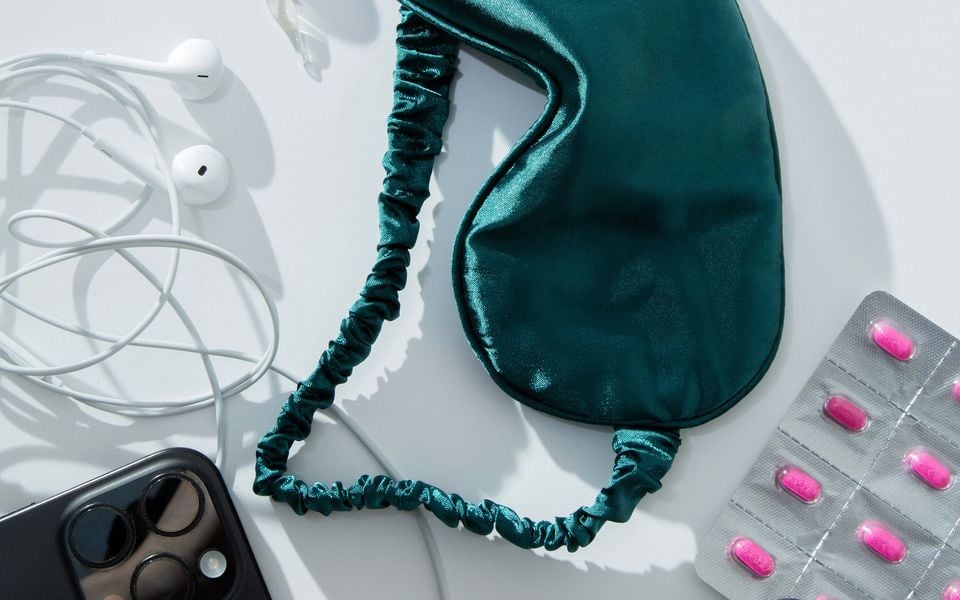Sleep aiding items such as items a teal silk sleeping mask, white headphones, an eyedropper, a blister pac of bright pink pills, and a smartphone in New York on Sept. 5, 2025. [Eric Helgas/The New York Times]
Q: I have trouble sleeping, and I’ve tried things like limiting blue light and counting backward from 100. Should I see a doctor?
A: Adjusting your sleep hygiene and trying a few bedtime hacks are generally good ideas. But sometimes, keeping a consistent bedtime or putting away your phone isn’t enough.
Up to 20% of people in the United States have chronic sleep disorders; however, most adults have never discussed sleep with a primary care provider. “Physicians aren’t asking enough about it, and people don’t think it’s something to go to the doctor about,” said Dr Lawrence Epstein, a sleep specialist at Brigham and Women’s Hospital in Boston.
While sleep disorders can seem self-evident, they’re often more subtle than you think, and experts recommend watching out for certain warning signs.
Some reasons to see a doctor about sleep
It’s normal to have a bad night of sleep now and then, said Philip Gehrman, the director of the Sleep, Neurobiology and Psychopathology lab at the University of Pennsylvania, especially if there’s a clear stressor like a big exam or work project.
However, experts say there are three main reasons to see a doctor – and some ways to distinguish what’s normal versus abnormal.
– Can’t Fall Asleep
When you’re in bed, you might feel your mind racing or have trouble getting comfortable. These are possible signs of insomnia and restless leg syndrome, a condition characterized by an uncontrollable urge to move your legs, Gehrman said. While stress or anemia may contribute to both conditions, there’s often no one common cause for these sleep disorders.
To get an official diagnosis, you have to experience these symptoms for at least three months. But you can certainly see someone sooner, Gehrman added, especially if your symptoms are getting worse or are interfering with your life.
Regularly reaching for alcohol, Benadryl, cannabis or even melatonin (without a doctor’s recommendation) to fall asleep can also be cause for concern, said Dayna Johnson, a public health researcher at Emory University Rollins School of Public Health. While these might help you doze off quickly, they can hurt sleep quality and mask an underlying sleep disorder.
– Can’t Stay Asleep
Sleep is not an eight-hour coma, and it’s normal to wake up several times, especially as you get older, said Dr Brienne Miner, a geriatrician and sleep specialist at Yale Medicine. But if these awakenings last more than five to 10 minutes or are bothersome, it might be a sign of a sleep disorder or another medical condition, she added.
For example, in a survey of adults ages 65 to 80 years, bladder issues, anxiety and pain were the three most common reasons for trouble sleeping, Miner said. Treating these can often improve patients’ sleep.
Some patients even experience parasomnias, or unusual behaviors like walking, eating, screaming or thrashing while asleep. While this can sometimes be harmless, especially among children, it might disrupt your sleep or cause injuries, said Dr Pahnwat Taweesedt, a sleep specialist at Stanford Health Care.
– Can’t Stay Awake During the Day
It’s normal to feel a little sleepy after lunch, in a dark room or on a comfy couch, but regularly feeling sleepy at work, while driving or during other important activities can be a sign of a deeper issue, Epstein said.
Sleep apnea, for example, is a condition when patients stop breathing during the night. You may not remember snoring, gasping and even choking at night but have morning headaches and feel exhausted throughout the day.
In rare cases, daytime sleepiness can also be a sign of narcolepsy, which is characterized by “sleep attacks,” where you suddenly fall asleep for a few seconds or minutes during the day. These patients also tend to have trouble staying asleep at night, Miner said, although sleep attacks are not directly connected to that. While narcolepsy sounds dramatic, it’s not always obvious: Patients have to wait about 10 to 15 years to get a diagnosis.
How to prepare for your appointment
Most sleep problems can be managed by your primary care provider or with a referral to a sleep specialist.
During your appointment, be specific about your sleep problem, whether it’s falling asleep, staying asleep or daytime drowsiness, Taweesedt said. Also consider keeping a sleep diary for two weeks beforehand, recording what time you wake up and go to bed, as well as your medications, exercise, alcohol and caffeine intake. But don’t obsess over tracking your sleep since that itself can make things worse.
If possible, bring a partner along: They may have noticed symptoms you haven’t, Johnson said. Sleep tracker data can also be helpful, she added, although consumer devices aren’t always precise.
Finally, conditions such as obesity, high blood pressure, kidney disease and Parkinson’s are often tied to sleep disorders, and many prescription medications impact sleep, Epstein said. So ask your doctor about them.
While it’s helpful, it isn’t necessary to have everything perfectly prepared before making an appointment. “Just go,” Johnson said. “You don’t need to write anything down; you don’t need to do anything in advance.”
This article originally appeared in The New York Times.
